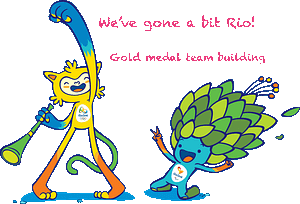What’s Olympic Rowing Got To Do With Team Building?
What’s rowing a boat got to do with team building and motivation?
I was recently lucky enough to hear Olympian Ben Hunt Davies speak on how his team of 8 men became Olympic rowing gold medal winners by repeatedly asking themselves a simple question… “will it make the boat go faster?” by adopting the focus of this mantra their responses were just as simple.
If the answer was yes they did it, if it was no they didn’t. The degrees that they took this philosophy to even included attending the opening ceremony Ben and his team asked themselves ”Will spending 5 hrs marching around waving a flag in a hot stadium, missing scheduled meals when training for the biggest race of your life make the boat go faster?” The answer was No!…so they didn’t go, (they watched it on TV) Was it the right decision? Ben will tell you…“everyone else got the glory but we got the gold!”
To help you develop your teams focus to the same level on your goals
Ben has listed his 5 top Olympic winning team building strategies.

“Everyone else got the glory, but we got the gold!”
5 Olympic-winning strategies for harnessing the power within your team
1. Clarity of Goals
Ben and his crew were absolutely clear on their goal, making the boat go faster to achieve an Olympic gold, and they translated this into yearly, monthly and daily goals. How often in the corporate world do we have an ill-defined sense of where we’re going and how often is this confusion multiplied by different interpretations amongst managers and staff? When everyone signs up to a clear, compelling goal we can make sure every ounce of effort is directed in the same direction. Clear goals are like magnets, pulling teams together.
2. Strong Belief
They diarised belief building sessions in the same way they scheduled weights or endurance training. Why? Because they realised beliefs were just as important. There is a huge raft of evidence to show that strong belief breeds positive behaviours. The crew created a list of reasons why they were becoming a great team and why they would win, this might translate into a list of reasons why the product and service is fantastic, or why the sales target is achievable.
3. Controlling the Controllables
They focused purely on the things they could control and let go of factors that they could not. This meant, for example, not worrying about weather conditions. Even though the weather has a huge impact on rowing performance but it was completely outside their control. We could reap huge dividends if we focussed our attention in the workplace more stringently on only controlling the controllables.
4. Bouncebackability
A high jumper who fails at their first attempt needs to pull themselves together to nail the second attempt in a matter of minutes. Sport psychology pays significant attention on how to perform under pressure and bounce back from defeat. When disaster strikes do we get caught up in analysis paralysis or do we dust ourselves off and take that all important next step forward?
5. BS Filters
Ben and his crew had countless people telling them their dream was impossible. The crew learnt not to confuse other people’s negative opinions with facts.
If their detractors were annoying they used this as emotional rocket fuel to spur themselves on. It is a powerful lesson, treat fact as fact and opinion as opinion. They would never shied away from painful facts, but were careful to challenge unhelpful opinions. Sport is more than just a powerful metaphor for business. Many of the sporting philosophies that underpin Gold can be transferred directly into the workplace.
Ben has teamed up with corporate performance coach Harriet Beveridge to write the book “Will it make the boat go faster? Olympic-winning strategies for everyday success”


